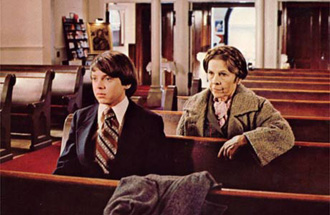Classic Movie Review: Harold and Maude
By Josh Spiegel
November 13, 2009
More than likely, someone at Paramount Pictures must have decided to get people interested (or should have) by invoking The Graduate. That black comedy seems to have heavily inspired Harold and Maude, even if only in stretches. One of Harold's faked suicides takes place in the pool at the mansion he and his mother live in, and it's hard to not flash back to Benjamin Braddock in the pool. Harold gets involved with an older woman, in something that would be taken as scandalous. The music of a singer-songwriter (Cat Stevens, in this case,) is used throughout the film for dramatic effect, and successfully, too. The main character of the film is disaffected and doesn't talk much. Okay, some of the comparisons are a bit of a stretch, but it's just as hard for me to not see the influence from the 1967 film as it is to see the genesis of Max Fischer from Rushmore.
The film's plot is as simple as can be: Harold, constantly bothered by his would-be sophisticate mother to do something with his life that isn't what he currently does, gets enjoyment out of aforementioned fake suicides (one highlight is his background firestarting attempt) and attending the funerals of people he's never met. At one of the funerals, he meets Maude, a woman whose 80th birthday is just around the corner. Despite the age, she's all id, doing whatever she pleases. Granted, most of whatever she pleases consists of stealing: she steals cars (a surprising amount of the cars in this movie have the keys just lying around, waiting for someone to take them), she steals trees, she even steals a policeman's motorcycle. Why does Maude do these things? So she can say that she did them when all is said and done.
Though Harold is initially put off by Maude, who ingratiates herself with the 19-year old during a funeral service where she recognizes him, they begin a budding friendship by doing seemingly frivolous but ultimately memorable things, from playing musical instruments to gallivanting around the San Francisco Bay area to going to carnivals. As morbidly as they may meet, these two become increasingly inseparable. All it adds for Harold is more reason to get as far from his mother as possible; once she decides it's time for him to marry someone, he's forced to suffer through three blind dates, all of which are excuses for him to faux-bludgeon himself in some way. The final date is a unique twist on the idea, and has a great final punchline.
Of course, by the end of the film, just when the end seems to be filled with smiles, rainbows, and other stereotypically happy things, there's one final, sad, yet inevitable twist. Suffice to say, it's not so easy to have a 19-year old and an 80-year old to be romantically involved, as nature will have its way in the end. Still, the very last shot is uplifting without being cheeseball, which is a balance the entire movie has to go through and manages to do without a single misstep. The film's director, Hal Ashby, and writer, Colin Higgins, give Harold and Maude, as characters, enough reality to make them feel like people we've encountered before, and provide enough realistic roadblocks to let all the goofiness, like planting a stolen tree or stealing an old-style Corvette, seem natural.
Ashby and Higgins were both memorable if underrated filmmakers; the former also directed Shampoo, Coming Home and Being There; the latter also wrote Foul Play, Nine to Five and a personal favorite, Silver Streak, which put Gene Wilder and Richard Pryor on the same screen together for the first time. Once the 1980s began, though, things began to fall in favor for the two, both of whom passed away before 1990 was rung in. Their contributions to American cinema were already sorely missed, but after watching Harold and Maude, a film brimming with vitality and genuine feeling, it's hard not to wonder what the world of film would've looked like had they made it to the end of the 20th century.
Continued:
1
2




